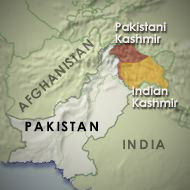
Before the 10-day trip to South Asia began, American President Barack Obama arrived in India. According to a new schedule, he will stay in India for three days, during which he will discuss important matters, as well as attend two summit meetings. Strict security procedures were arranged for his arrival. According to American and Indian media reports, the American president’s first extensive Asian trip is connected to trade, defense and economic development. The loss in the midterm elections that the American president has had to face, his view on the economic crisis and ending unemployment are said to be the foundation of Obama’s trip. This means that during this tour of India, Indian leaders will try to avoid speaking about the Kashmir issue and will keep him focused on the completion of financial, defense, economic and trade benefits; if this is the American mindset, then no matter how much one regrets it, it is not enough.
This is the very reason that at the time of President Obama’s trip, the International People’s Tribunal on Human Rights and Justice presented the president with a 10-point memo and strongly urged him to openly discuss the Kashmir issue; American officials have confirmed receipt of this memorandum. In the memorandum, the Tribunal, urging President Obama during his tour of India to resolve the issue of Kashmir, said that he should intervene on this issue, even though the Tribunal — along with India’s civil societies, the international community, the European Union, the OIC and China — has appealed for the right of Kashmir to determine its future. The memorandum is a true reminder of historical facts that clarifies that for India, the dialogue process on the Kashmir issue is a farce, and taking the types of steps that India wants will not help advance conditions in Kashmir.
The American media — using examples from the Clinton and Bush eras and scoffing at the Obama administration — says that cordiality is missing from India, which is very different from the regimes of the two aforementioned former presidents. Now the president, for the sake of the return of that cordiality, should not use that past but instead, by discussing the Kashmir issue, should not avoid — as it historically has been — the region’s peace and the consent of the Kashmiri people’s interests and advancement. As far as Pakistan’s rudimentary stance is related, it is no secret to the American president. Pakistan has always realized that as long as India does not become serious about resolving the Kashmir issue, the point will remain strong in their stance due to the problems of the region. This basic fact should not be ignored by President Obama.
The biggest reason for South Asia’s unrest and alienation is the Kashmir conflict between Pakistan and India. This issue is linked to world peace and security, just as how in the Middle East, the Palestinians are victims of wrongdoing and oppression because of Israel’s aggression and atrocities. The very same conditions have been born in Jammu and Kashmir by Indian aggression, domination and authoritarianism. For 62 years, India has kept it up with no results from dialogue processes and with fruitless exercise — even though Pakistan’s stance is that it is time to resolve the Kashmir conflict through discussion. The truth of the matter is that Pakistan cannot even imagine withdrawing from its historical and principled stance on the Kashmir issue. Therefore, for the resolution of the Kashmir conflict in light of positive U.N. resolutions of assistance and support, America’s efforts of elusiveness to form peace in this region prove that it will not be of any help. The basic truth is that instead of India being an obstacle in the path of this issue and the stubbornness to call it a separation, it should accept the fact that there is no way but to give the Kashmiri people their right to self-determination.
What is interesting is that before Obama left for his India tour, an article was recently published in which four Asian countries’ economic and commercial importance and the bilateral relationship with them is referred to, but Pakistan’s economic and financial importance is not even mentioned. Obama said that the biggest challenge America has to face is employment, economic growth and preparation of competition in markets, but actually he is looking for jobs in Asian markets and reviewing the possibility of American consumption of goods. Therefore, the people of Pakistan do not expect that he can schedule a discussion in India for the resolution of Kashmir.
In the editorials of The New York Times, it was said that this Asian trip is about economics and the stability of the American commercial agenda, in which defense and trade issues will be discussed. The newspaper has stated that India made it clear to America that there will be no discussion on Kashmir, even though it needs to be implemented that Obama insist that India begin talks with Pakistan on the resolution of the Kashmir issue. Furthermore, the newspaper mentioned that Obama will definitely raise the issue of taking action against those responsible for the Mumbai attacks. Now with this intention, if Obama is going to take a trip to India and critical South Asian countries, then truly the people of Pakistan have the right to express astonishment and regret on this American style. It is important to demand that during this trip, President Obama not limit himself to finding American markets and the consumption of American products; otherwise, this will be greatly unfortunate.
To reference the International People’s Tribunal on Human Rights and Justice memorandum to President Obama: http://www.kashmirwatch.com/showheadlines.php?subaction=showfull&id=1288886975&archive=&start_from=&ucat=1&var0news=value0news

Leave a Reply
You must be logged in to post a comment.